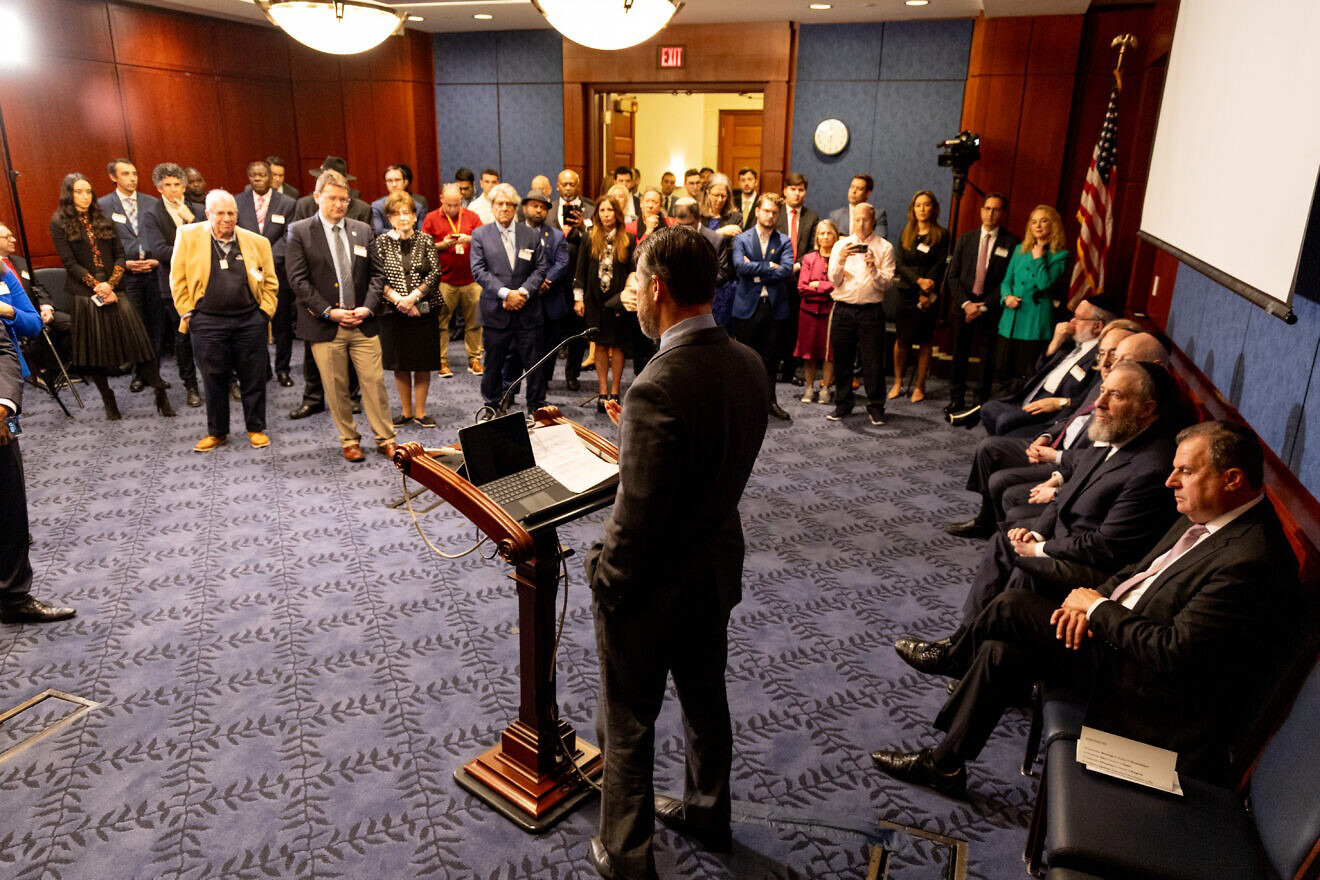Courtesy of JNS. Photo credit: 5K Film
An event at the U.S. Capitol celebrating the Abraham Accords, Dec. 17, 2024
(JNS) — Some 100 people gathered in the U.S. Capitol on Tuesday night for an event that was supposed to be bipartisan, celebrating the Abraham Accords, which were signed in the fall of 2020 the waning months of the first Trump administration and which normalized relations between Israel and some of its Arab neighbors.
Rep. Debbie Wasserman Schultz (D-Fla.) was the only Democratic lawmaker to show up, however, and congressional Republicans accused the Biden administration of letting the historic agreement languish.
“This administration has been so inept in dealing with the Middle East. We see the catastrophe that has resulted,” Rep. Mike Lawler (R-N.Y.) told JNS at the event. “Now, obviously, as we move forward and the Trump administration comes back into power, I suspect that there’ll be great focus and attention on expanding the Abraham Accords again.”
Lawler told JNS that the Jewish state was wise to ignore directions from Washington.
“Had Israel listened to this administration, Hamas would be intact. Hezbollah would be intact. Assad would still be in charge in Syria,” he said. “The Middle East is changing, and obviously under strong American leadership, I think we’ll be in a better position to get the support from other Arab states moving forward.”
Sen. Todd Young (R-Ind.) told JNS at the event that U.S. President Joe Biden “has not provided tons of hope” about a plan to stabilize the region. The incoming Congress will provide “an opportunity for Republicans and Democrats to hit reset,” he said.
“I think we should think big,” he added, of expanding the accords.
At the event, Young told attendees that “the path towards peace and stability in the Middle East still runs through Jerusalem.”
“The Trump administration recognized the possibilities. It was a different day then, but they recognized the possibility of more peace and more stability and improved relations in the Middle East and they prioritized that,” Young told attendees. “The Biden administration pledged that they would build on those efforts. There’s not been a whole lot of success in that regard, to put it charitably.”
Young hinted that there is a tangible level of bipartisan support possible going forward. “Republicans in Congress, and dare I say a whole lot of Democrats, are also ready to work together on this project,” he said at the event.
Rep. John Rose (R-Tenn.), who spoke during the event, told JNS that “there are elements of the Democratic Party that had an outside outsized influence on Biden,” who pressed against investing in the development and expansion of the Abraham Accords.
“I wish that wasn’t so, but at the very least, I think they managed to make that not be a priority of his administration,” he told JNS. “That’s very unfortunate.”
Current Democratic leadership “is out of step with where their party is historically” on the issue of Israel, Rose said.
“I think they run the risk of alienating the Jewish community if they continue down this path,” he said. “So it is troubling that they are allowing what I would describe as kind of a cancer to exist in the Democratic caucus on the House side.”
Rose hopes Democrats “find their way, but at least recent events suggest that they aren’t,” pointing to recent Democratic Senate leadership votes in which five of the 11 leadership members voted in favor of Sanders’s Israel arms embargo vote last month.
Sen. Kevin Cramer (R-N.D.) said at the reception that he has spent recent weeks meeting with Arab leaders, “who are grateful for the opportunity that this election presents them.”
Despite the risks that come with re-engaging with Israel amid Jerusalem’s diplomatic isolation, Cramer said that “the risk is greatly mitigated by a president and an administration and a Congress that doesn’t put ‘but’ after ‘unequivocal.’”
The current crisis in the Middle East has created a “momentum” under which many Arab states are looking for leadership and assurances from America, Cramer told JNS. He said the violence roiling the region since Oct. 7, 2023, and the Iran-backed forces who have met their downfall “actually escalated” the need for a strong America “and became clear.”
Cramer told JNS that he is hopeful that Democrats will be more willing to step forward to advance the Abraham Accords in January.
“When you see what’s going on in the world, and you see a president willing to step up, just like some of these other countries, Democrats see a serious effort and want to be part of something that’s successful,” he said.
Cramer recently spent six hours on a plane with Steve Witkoff, Trump’s close friend and appointee to the Middle East envoy position. The two discussed the future of the accords, he said.
“I was more encouraged than ever about the kind of leadership that this administration is prepared to put forward, not just in legislation, not just in policy, not just in rhetoric, but in real investment of reputation,” Cramer said at the event.
Bobby Rechnitz, a philanthropist and real estate developer with ties to Israeli Prime Minister Benjamin Netanyahu, and The Friedlander Group hosted the reception at the Capitol. It marked the fourth anniversary of the U.S.-brokered agreements between Israel, the United Arab Emirates, Bahrain and Morocco.
While playing up the general bipartisan spirit behind the accords, Rechnitz told JNS that he is frustrated with Senate Majority Leader Chuck Schumer (D-N.Y.), who has been holding back Democratic support on pro-Israel legislation for political reasons, according to Rechnitz. Schumer is doing so, to Rechnitz, to appease the anti-Israel wing of the Democratic Party or to avoid exposing party fault lines on the issue.
Rechnitz said Democrats received invitations to Tuesday’s event, but only Debbie Wasserman Schultz attended. The philanthropist praised the Jewish congresswoman from Florida for fighting through party pressure to advance pro-Israel causes.
Wasserman Schultz announced at the event that she will co-chair the Abraham Accords Caucus in the next Congress. “A new Middle East is taking shape, and U.S. leadership, along with close cooperation with Arab partners, is essential to advance the dream that we envisioned on Oct. 6, not the nightmare that we woke up to on Oct. 7,” she said.
Wasserman Schultz met with Saudi Crown Prince Mohammed bin Salman on the eve of Hamas’s massacre. “The Abraham Accords provide a framework for this future,” she said. “Normalization, cooperation and engagement are crucial steps to promote peace.”
The congresswoman praised Biden and U.S. Vice President Kamala Harris, who “have invested significantly in keeping this goal alive and managing the region’s challenging politics.”
Lawler, the Republican congressman from New York, said at the event that Schumer caved to liberal demands when he held up the Antisemitism Awareness Act in the Senate, along with Lawler’s Israel anti-boycott bill.
Schumer refused to bring the bills up for votes, “because we didn’t want to upset Bernie Sanders,” Lawler said. Using an expletive, he wondered aloud who cares what Sen. Bernie Sanders (I-Vt.), an anti-Israel progressive lawmaker, does.
Lawler and Rep. Ritchie Torres (D-N.Y.) spearheaded a 2024 law to create a presidential envoy position to advance the Abraham Accords, which the Biden administration has left unfilled. Lawler said that he doesn’t have any recommendations at the moment on who should be appointed as the envoy in the new administration.
Jason Greenblatt, an architect of the accords while serving as Trump’s special representative for international negotiations, held a question-and-answer session with attendees at Tuesday’s reception.
JNS asked Greenblatt how long he thinks it could take after the conclusion of the Israel-Hamas war to return to an Oct. 6 Abraham Accords environment given that diplomatic relations have chilled between Israel and its accords partners.
“Put on your UAE glasses,” Greenblatt told JNS. “Don’t put on your Israel glasses.”
He noted that every country is dealing with its own political, security and economic matters. “As much as they want this relationship with Israel to be strong and consistent and expand, they also have to worry about what’s happening in their own region,” he said.
Greenblatt applauded the accords countries for maintaining the treaties, even as they clamped down on public displays of diplomatic affection for Israel during the war. “I think that as time goes on, they will remain committed to it,” he said.
Aaron Keyak, the State Department’s deputy special envoy to monitor and combat antisemitism, was the lone Biden administration representative at the event. Ayoub Houchem, political counselor from Morocco’s embassy in Washington, was the only representative of an Abraham Accords country present at the event.





